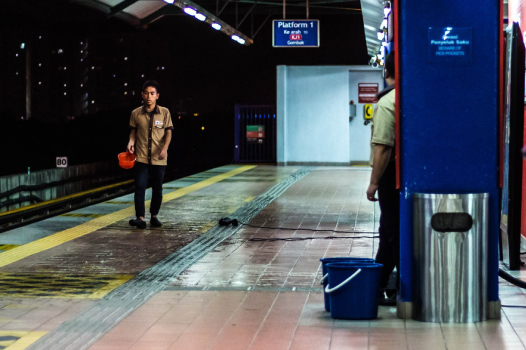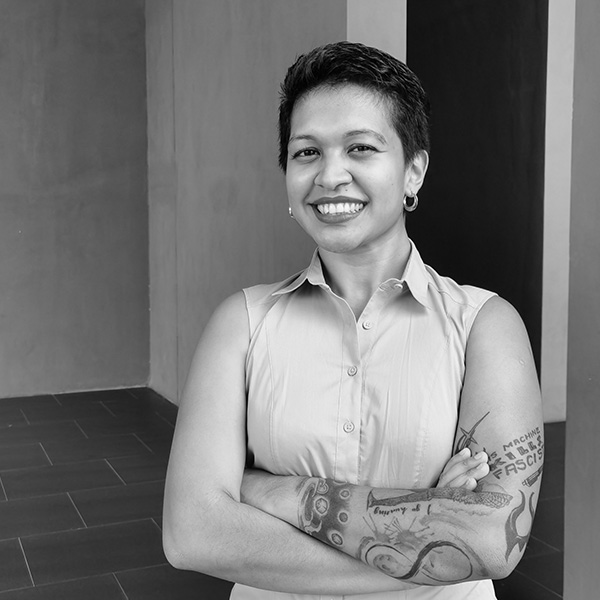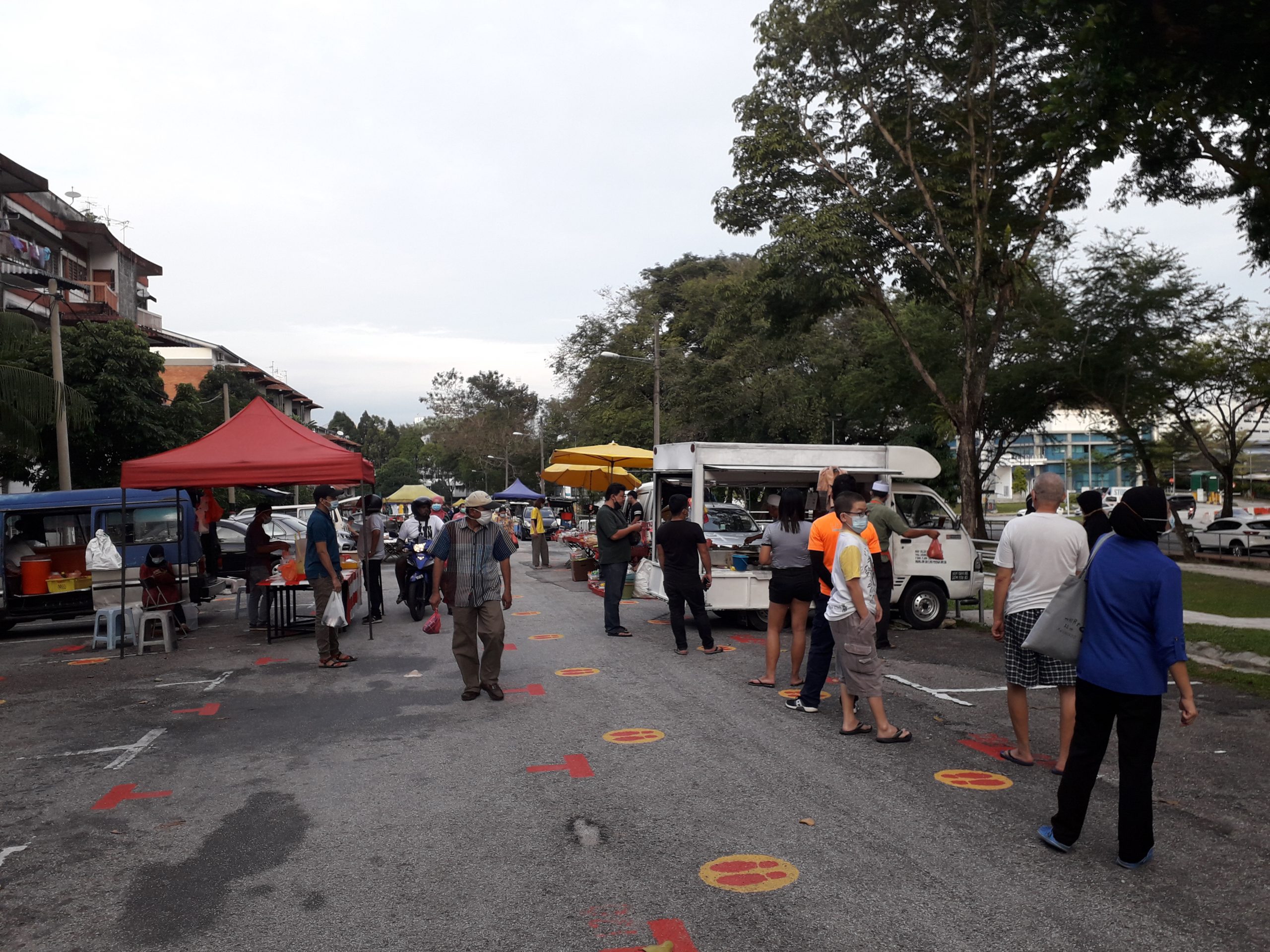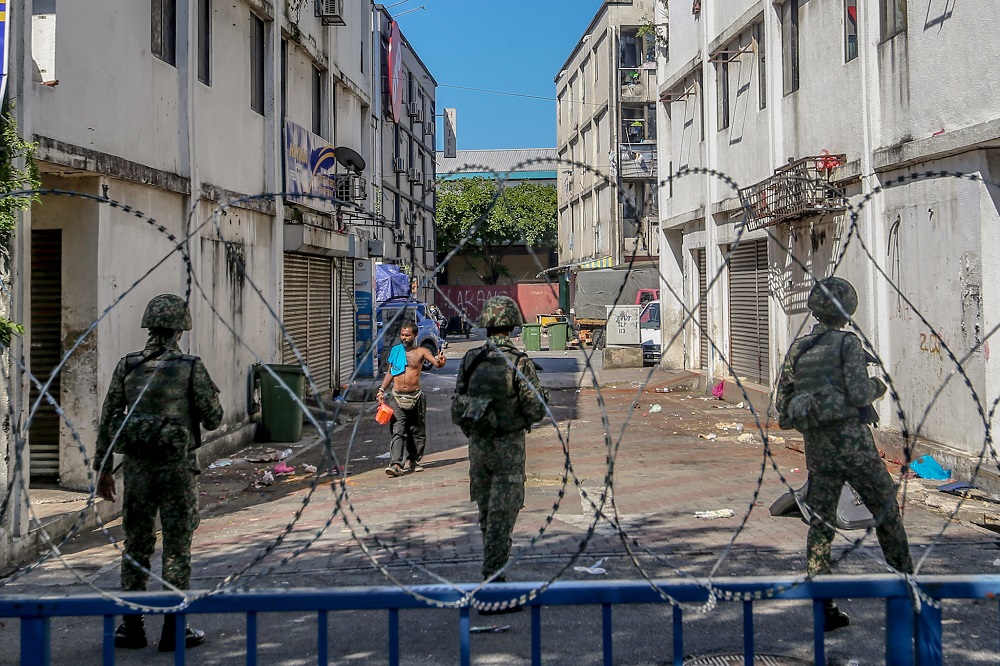The COVID-19 pandemic has unleashed some of the best and worst traits of Malaysians. When Malaysia imposed a ‘stay in shelter’ lockdown in mid-March, known as the Movement Control Order (MCO) or Perintah Kawalan Pergerakan, an outpouring of charitable acts by ordinary Malaysians to help fellow Malaysians followed. The official slogan of #KitaJagaKita, roughly translated as “we protect each other,” reflected the spirit of a movement organised by netizens directing donors and other well-wishers to various vulnerable groups throughout the country adversely affected by the lockdown (#kitajagakita 2020).
However, the pandemic also brought out an uglier side of Malaysian society. As COVID-19 cases among migrants were highlighted, so were xenophobic sentiments in Malaysia. National newspapers printed op-eds and articles implying migrants are dirty and unsanitary. Undocumented migrants were particularly vilified, long labelled as ‘illegals.’ Appeals to authorities to deport Rohingya refugees increased after anti-Rohingya sentiment proliferated in social media and beyond, with previously sympathetic Islamist groups turned against persecuted refugees from Myanmar (Bedi 2020).
Worsening public sentiment against migrants coincided with policies further ostracising and penalising them. Although the government initially promised amnesty to undocumented migrants seeking care for COVID-19, this was soon followed by several major immigration raids which led to mass detentions in the name of public health (The Straits Times 2020). Additionally, in the midst of concerns of rising unemployment in the aftermath of the pandemic, the Malaysian government announced restrictive policies on hiring migrants as part of efforts to increase citizens’ employment opportunities including limiting migrants to working only in the agriculture, construction and plantation sectors despite manufacturing and services sectors being the largest employers of the migrant workforce (Tan et al. 2020, Azril 2020).
The xenophobic sentiment towards migrants is perhaps unsurprising, as even in a pre-pandemic world, migrants have long experienced discrimination in Malaysia (Zainal et al. 2016). Unfortunately, during the pandemic, not only have such negative traits become increasingly pervasive in society, but they also seem to influence public policies and affect the lives and livelihoods of migrants in Malaysia.
Given the grave consequences of xenophobic sentiments in society, we need to examine the claims and allegations made against these ostracised populations. Are undocumented migrants truly criminals? Do migrants bring in and spread disease in the host country? Does hiring migrants adversely affect locals’ job opportunities and the economy? These are crucial policy questions that need to be answered based on facts and evidence.
Are undocumented migrants criminals?
At the height of the COVID-19 pandemic in Malaysia, several major immigration raids were conducted to arrest undocumented migrants, who were depicted as criminals for entering and/or staying in the country illegally (CodeBlue 2020). As of 4 August 2020, 18,355 undocumented migrants had been detained during these immigration raids (Muhammad 2020).
However, labelling all undocumented migrants as criminals is grossly unfair as for many migrants, the events leading to their illegal status involve their abuse and exploitation. Based on detailed accounts by Amnesty International, some migrants incur significant costs migrating to work in Malaysia, often borrowing under onerous conditions to pay recruitment agents, but continuing to be abused before, during and even after working in Malaysia. Many do not get work passes promised, namely the Temporary Employment Visit Pass (Pas Lawatan Kerja Sementara) for low- to mid-skilled migrant workers, and have their travel documents withheld by their employers. In the event they are not granted work passes for any reason, such as failing the mandatory health screenings1, they are still compelled to work off their debt to the agents and other creditors. In such circumstances, many have no choice but to remain in Malaysia to work as undocumented workers, or after their work passes expire.
In the aftermath of the COVID-19 pandemic, more migrant workers have had their legal status revoked. Following imposition of the lockdown in Malaysia, several reports have surfaced regarding unfair terminations and unpaid wages by employers of migrant workers (ILO 2020). Such practices by employers, coupled with the government promise to limit the number of migrant workers in Malaysia, has had the effect of forcing documented migrant workers to lose their work passes, and thus become undocumented. This is a result of existing official policies and practices, with work passes for migrant workers effectively bonding them to their employers. Should the migrant worker be terminated, they are repatriated, and those who seek other employment opportunities are deemed ‘illegals’ and blacklisted (IMI n.d.).
Furthermore, immigration raids have also resulted in the arrest of refugees, including Rohingyas forced to flee their home country due to persecution (Ahmed 2020). Refugees are officially considered undocumented migrants in Malaysia as the country has not ratified the 1951 Refugee Convention (Puteri et al. 2019). As of mid-2020, 177,940 refugees had registered with the United Nations High Commissioner for Refugees in Malaysia, with most (101,320) being Rohingyas fleeing from Myanmar (UNHCR 2020).
Based on the above, although undocumented migrants do not have legal status in Malaysia due to not having legal documentation to live and work in the country, their illegal status does not automatically make them ‘criminals’. It should be clear that the circumstances leading to their undocumented status are often beyond their control; in fact, the abuse and exploitation they face make them victims rather than perpetrators of crimes.
Do migrants bring and spread diseases?
Throughout history and across the world, migrants have been scapegoated as carriers of disease. According to the International Organization for Migration (IOM), migrants are often conflated with ‘foreign’ diseases, and have been depicted as endangering local populations by bringing in and spreading diseases within host countries (IOM 2020). In Malaysia, communicable diseases such as tuberculosis (TB), hepatitis B, syphilis and HIV/AIDS are thought to be concentrated in the migrant population (Azizah 2017).
In reality, literature suggests that when migrant workers first arrive in the host country, they are often among the healthiest. This has been attributed to the higher likelihood of healthy and physically fit people successfully making it through challenging migration processes, which typically include passing mandatory health screenings (Davies et al. 2006, IMI n.d.). After screening, migrants are often repatriated if found to have communicable diseases or considered unfit. Data from such health screenings done in Peninsular Malaysia indicate that most screened documented migrant workers are fit to work, with only 2.2% deemed unfit in 2017 (ILMIA 2020, authors’ calculations). Furthermore, despite increasing numbers of documented migrant workers in Malaysia, the number of communicable diseases—such as TB, hepatitis B and sexually transmitted diseases (STDs)—detected by these screenings has been declining over the years (see Figure 1).
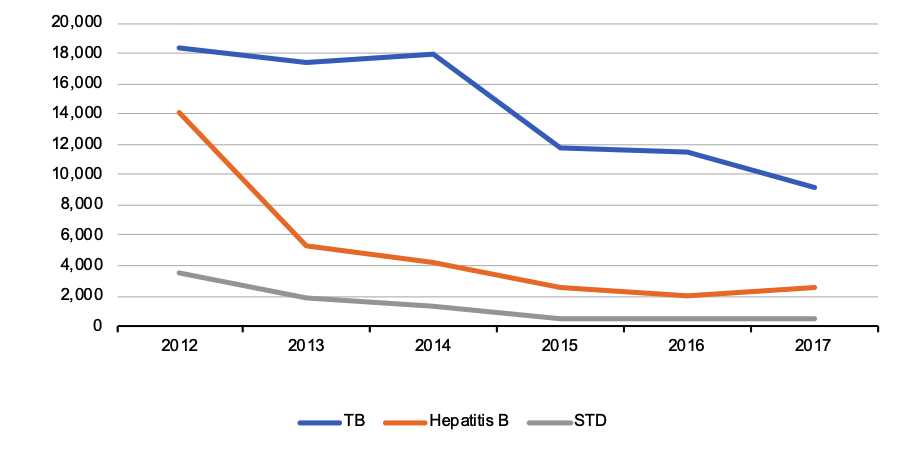
Figure 1: Number of TB, hepatitis B and STD cases detected by health screening of documented migrant workers in Peninsular Malaysia, 2012 – 2017 Source: ILMIA (2020)
Rather than bring disease into Malaysia, migrants may experience their health deteriorating while in the host country, especially since they face higher barriers to healthcare. While citizens enjoy highly subsidised access to public healthcare, migrants are not eligible and face high fees from healthcare providers despite being among the lowest paid in Malaysia. Although documented migrant workers are covered by the Hospitalisation and Surgical Scheme for Foreign Workers (SPIKPA), a mandatory health insurance scheme for migrant workers, they typically still have to pay out-of-pocket expenses for medical care as the scheme only provides coverage for hospitalisation and surgery at government hospitals (Loganathan, et al. 2019).
Undocumented migrants face even greater barriers to accessing healthcare in Malaysia, as many are deterred from seeking healthcare due to fears of arrest and deportation because of their legal status. This fear is not unfounded; during his visit to Malaysia in 2014, the UN Special Rapporteur found “immigration counters inside public hospitals [facilitating the referral] of undocumented migrants and asylum seekers to the police when they come seeking medical attention.” (Pūras 2014)
Both documented and undocumented migrants also reside in poor living conditions, often sharing overcrowded quarters, which increases their risk of contracting communicable diseases (Jarud et al. 2020). The government has improved migrant workers’ accommodation standards through amendments to the Workers’ Minimum Standard of Housing and Amenities Bill, though gaps remain as employers are not obliged to provide accommodation (MOHR 2019). If migrants look for accommodation themselves, they may try to lower costs by living together in crammed units, leaving them more vulnerable to infectious diseases.
The global trend of scapegoating migrants has persisted during the COVID-19 pandemic (Guadagno 2020). The spike in COVID-19 cases among migrant workers in neighbouring Singapore and within Malaysia, particularly in May, fanned accusations that migrants were mainly responsible for the spread of COVID-19 (Nuradzimmah 2020). This situation was exacerbated by government officials stressing that immigration raids conducted during the lockdown in Malaysia were necessary to protect “our own innocent citizens” from the disease (CodeBlue 2020).
Unsurprisingly, the health challenges faced by migrants in Malaysia only serve to worsen their vulnerability to COVID-19. As of 27 August, 2,742 cases or 29.5% of all cases in Malaysia were among migrants (MOH 2020, authors’ calculations). Considering non-citizens make up just a little over 10% of the population, this suggests that migrants are disproportionately susceptible to COVID-19 infection. It is worth noting that the majority of COVID-19 cases among migrants were locally transmitted2 and many were tested and detected among detainees in congested immigration depots (Kanyakumari 2020). Thus, the trends in COVID-19 cases in Malaysia indicate that contrary to the myth that migrants are carriers of disease who bring in infections from foreign countries, their poor living conditions and inability to access healthcare often make them more vulnerable to infectious disease3.
Do migrant workers steal jobs from locals? Are they ‘bad’ for the economy?
Migrants are often blamed for worsening unemployment in the host country and the economy as a whole. In the 2018 World Values Survey, 55.7% of respondents in Malaysia thought that immigration increased unemployment (Haerpfer et al. 2020). In a national survey conducted by ILO and UN Women in 2019, 47% of respondents stated that migrant workers have an overall negative effect on the Malaysian economy (see Figure 2). As unemployment reached record highs in Malaysia and GDP recorded the largest contraction since the 1997 Asian Financial Crisis as a result of the COVID-19 pandemic, these negative perceptions about migrant workers have only worsened and resulted in migrant workers being side-lined in favour of local workers.
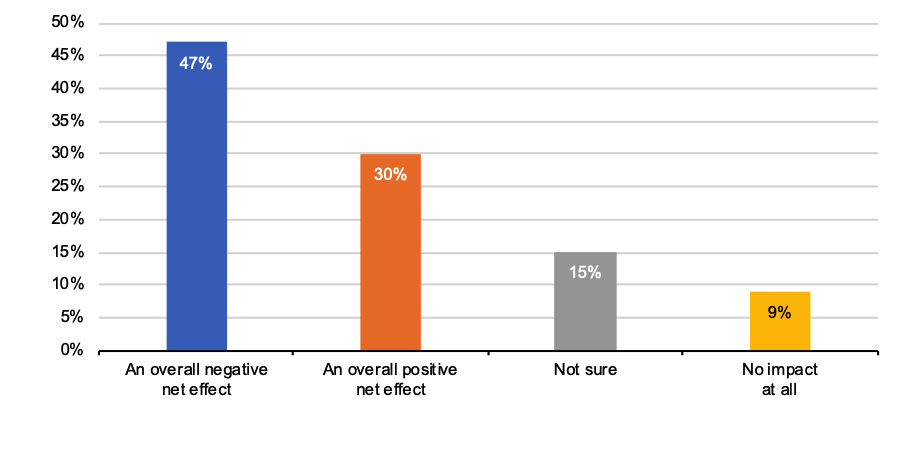
Figure 2: What effect do migrant workers have on the national economy? Source:ILO-UN Women (2019)
In reality, there is no evidence to support the perception that migrants increase unemployment among Malaysians. Using data from 1990 to 2010, a World Bank study of the effects of migrant workers in Malaysia found that a 1% increase in migrant workers resulted in a 0.1% and 0.3% increase in full- and part-time employment respectively. The study also showed that a 10% increase in migrant workers increased Malaysia’s GDP by 1.1% (Del Carpio et al. 2013).
In fact, contrary to public perception, the entry of migrant workers is necessary to fill up jobs which locals refuse to do. Over the years, Malaysia’s economic structure has remained labour-intensive, mainly employing low- and semi-skilled workers, while the Malaysian labour force has become increasingly educated. As Malaysians occupy higher skilled jobs, migrant workers were brought in to meet the increasing demand for lower-skilled workers in the country willing to accept low wages and worse working conditions (Tan et al. 2020). Major construction and development projects, such as the Petronas Twin Towers, Kuala Lumpur International Airport and Cyberjaya, involved hiring large numbers of migrant workers to fill labour needs (Crinis 2005). Even today, Malaysia’s economy relies on migrants to take up jobs deemed dirty, dangerous, depressed and difficult by locals, such as working on factory floors, serving, cooking and cleaning restaurants, construction and agricultural labour.
In short, given that migrant workers generally do not occupy the same occupational space as local workers, job competition between both groups of workers is minimal. Migrant workers have contributed significantly to Malaysia’s economy, working in jobs shunned by the locals, yet essential for the country.
Conclusion and ways forward
As fears of the virus fuelled anti-Asian racism in some parts of the world, it has increased xenophobia in Malaysia (HRW 2020). It is perhaps inevitable that the rise of xenophobia in Malaysia would push migrants, especially undocumented ones, further into the margins of society, with potentially significant effects for the country’s ability to control the COVID-19 pandemic. For example, if migrants do not feel safe seeking medical attention, infections among this group may go undetected until they have spread far into the wider population. As migrant workers are a significant part of Malaysian society, it is crucial that their health and wellbeing are protected, not just for their own sake, but also to benefit all. It is arguably especially morally reprehensible to benefit from the labour of those doing the worse work, but to ostracise them in a myopic and selfish manner doing harm to all in the face of the pandemic.
The demonisation of migrants has not happened overnight. Similarly, eliminating the ideologies and cultural prejudices sustaining this will take time. The media, particularly social media, has likely contributed to the problem. In the digital age, social media has become more influential than ever, posing new challenges for managing ‘fake news,’ misinformation and disinformation. One example of social media influencing public views includes an edited video featuring Rohingya activist Zafar Ahmad demanding full citizenship for Rohingyas in Malaysia going viral, angering netizens and escalating anti-Rohingya sentiment (Bedi 2020). Obviously, policymakers would need to consider these new challenges to rein in disinformation and hate speech.
Furthermore, there must be conscious widespread efforts to reconsider terms used when discussing migrants, in addition to correcting common misconceptions that effectively dehumanise migrants. In Malaysia, the use of the term ‘illegals’ to refer to undocumented migrants is all too common, which contributes to the perceived criminalisation of migrants. Furthermore, to combat misconceptions against the migrant population in Malaysia, it is important that we gather better, more reliable data that enables us to better understand their living and working conditions as well as their health status. The formation of a special committee specifically tasked to get more accurate statistics on documented migrants is a step in the right direction by the government, but an action plan to understand undocumented migrants in the country remains warranted (Carvalho et al. 2020).
Regardless of nationality, everyone should be treated with respect, care and dignity, and their basic human rights are upheld in all circumstances. To emerge from this pandemic stronger, we must be united not only in fighting the battle against the epidemic, but also against prejudice and dehumanization. As stated by Tedros Adhanom, Director-General of the World Health Organization, “(o)ur greatest enemy right now is not the virus itself. It’s fear, rumours and stigma. Our greatest assets are facts, reason and solidarity.” (Adhanom 2020)
18 September , 2020
(This essay draws from “COVID-19: We Must Protect Foreign Workers,” a discussion paper that explains the feasibility of protecting migrant workers in Malaysia. The authors are grateful for the valuable comments by Tan Theng Theng and Jomo Kwame Sundaram. All errors remain those of authors.)
Disclaimer: Any views, thoughts and opinions expressed in the essay belong solely to the authors, and not necessarily to the authors’ employer.
References
- #kitajagakita. 2020. #kitajagakita – Malaysians helping Malaysians fight COVID-19. https://kitajagakita.com/. (Accessed 30 August 2020)
- Adhanom, Tedros. 2020. WHO Director-General’s opening remarks at the media briefing on COVID-19. World Health Organization. 28 February. https://www.who.int/dg/speeches/detail/who-director-general-s-opening-remarks-at-the-media-briefing-on-covid-19—28-february-2020. (Accessed 30 August 2020)
- Ahmed, Kaamil. 2020. Malaysia cites COVID-19 for rounding up hundreds of migrants. The Guardian. 2 May. https://www.theguardian.com/global-development/2020/may/02/malaysia-cites-covid-19-for-rounding-up-hundreds-of-migrants. (Accessed 29 August 2020)
- Amnesty International. 2010. Trapped: The Exploitation of Migrant Workers in Malaysia. Amnesty International, London. https://www.amnesty.org/download/Documents/36000/asa280022010en.pdf. (Accessed 30 August 2020)
- Azizah Kassim. 2017. Recent trends in transnational population inflows into Malaysia: Policy, issues and challenges. Malaysian Journal of Economic Studies, 51(1), 9-28. http://mycc.my/document/files/PDF%20Dokumen/Foreign%20Labour%20in%20Malaysia%20Selected%20Works.pdf. (Accessed 30 August 2020)
- Azril Annuar. 2020. Putrajaya limits foreign workers only to construction, agriculture, plantations sectors. Malay Mail. 29 July. https://www.malaymail.com/news/malaysia/2020/07/29/putrajaya-limits-foreign-workers-only-to-construction-agriculture-plantatio/1889109. (Accessed 31 August 2020)
- Bedi, Rashvinjeet S. 2020. Please don’t hate us, Rohingya plead with Malaysians. The Star. 26 April. https://www.thestar.com.my/news/focus/2020/04/26/please-don039t-hate-us-rohingya-plead-with-malaysians. (Accessed 30 August 2020)
- Carvalho, Martin, Hemananthani Sivanandam, Tarrence Tan, and Fatimah Zainal. 2020. Special committee formed for accurate stats on foreign workers, says HR Minister. The Star. 5 August. https://www.thestar.com.my/news/nation/2020/08/05/special-committee-formed-for-accurate-stats-on-foreign-workers-says-hr-minister?utm_source=socialdog. (Accessed 30 August 2020)
- Chen, G. 2020. Pasar Borong Kuala Lumpur now cleaner and roomier. The Star. 5 May. https://www.thestar.com.my/news/nation/2020/05/05/pasar-borong-kuala-lumpur-now-cleaner-and-roomier. (Accessed 30 August 2020)
- CodeBlue. 2020. Ismail Sabri Doubles Down On Nabbing Undocumented Immigrants. CodeBlue. 26 May. https://codeblue.galencentre.org/2020/05/26/ismail-sabri-doubles-down-on-nabbing-undocumented-immigrants/. (Accessed 30 August 2020)
- Crinis, Vicki. 2005. The Devil You Know: Malaysian Perceptions of Foreign Workers. RIMA: Review of Indonesian and Malaysian Affairs, 39(2): 91-112. https://search.informit.com.au/documentSummary;dn=253221486612103;res=IELIND. (Accessed 30 August 2020)
- Davies, Anita A., Anna Basten, and Chiara Frattini 2006. Migration: A Social Determinant for the Health of Migrants. International Organization for Migration. https://ec.europa.eu/migrant-integration/index.cfm?action=media.download&uuid=2AA986F7-DBA1-D96C-9028652AF54FC2C1. (Accessed 30 August 2020)
- Del Carpio, Ximena, Rajeswari Karupiah, Mohamed Ali Marouani, Çağlar Ozden, Mauro Testaverde, and Mathis Wagner. 2013. Immigration in Malaysia: Assessment of its Economic Effects, and a Review of the Policy and System. World Bank, Washington, DC.
- FMT. 2020. Banning foreigners, refugees from mosques against Islam, say NGOs. Free Malaysia Today. 11 June. https://www.freemalaysiatoday.com/category/nation/2020/06/11/banning-foreigners-refugees-from-mosques-against-islam-say-ngos/. (Accessed 30 August 2020)
- Guadagno, Lorenzo. 2020. Migrants and the COVID-19 pandemic: An initial analysis. Migration Research Series 60, International Organization for Migration. https://publications.iom.int/system/files/pdf/mrs-60.pdf. (Accessed 29 August 2020)
- Haerpfer, C., Inglehart, R., Moreno, A., Welzel, C., Kizilova, K., Diez-Medrano J., M. Lagos, P. Norris, E. Ponarin, and B. Puranen et al. (eds). 2020. World Values Survey: Round Seven – Country-Pooled Datafile. JD Systems Institute & WVSA Secretariat, Madrid & Vienna. http://www.worldvaluessurvey.org/WVSDocumentationWV7.jsp. (Accessed 30 August 2020)
- Health DG. 2020. From the Desk of the Director-General of Health Malaysia. https://kpkesihatan.com/. (Accessed 30 August 2020)
- HRW. 2020. Covid-19 Fueling Anti-Asian Racism and Xenophobia Worldwide. Human Rights Watch. https://www.hrw.org/news/2020/05/12/covid-19-fueling-anti-asian-racism-and-xenophobia-worldwide. (Accessed 29 August 2020)
- ILMIA. 2020. The Socio-Economic Impact From Employment Of Low-Skilled Foreign Workers And International Internship Programme In Malaysia. Institute of Labour Market Information and Analysis, Kuala Lumpur. https://www.ilmia.gov.my/index.php/my/component/zoo/item/the-socio-economic-impact-from-employment-of-low-skilled-foreign-workers-and-international-internship-programme-in-malaysia. (Accessed 29 August 2020)
- ILO. 2020. COVID-19: Impact on migrant workers and country response in Malaysia. International Labour Organization, Geneva. https://www.ilo.org/wcmsp5/groups/public/—asia/—ro-bangkok/documents/briefingnote/wcms_741512.pdf. (Accessed 29 August 2020)
- ILO-UN Women. 2019. Public attitudes towards migrant workers in Japan, Malaysia, Singapore, and Thailand. International Labour Organization and UN Women. https://www.ilo.org/wcmsp5/groups/public/—asia/—ro-bangkok/documents/publication/wcms_732443.pdf. (Accessed 30 August 2020)
- IMI. n.d. Foreign Worker. Immigration Department of Malaysia, Ministry of Home Affairs. https://www.imi.gov.my/portal2017/index.php/en/foreign-worker.html. (Accessed 30 August 2020)
- IOM. 2020. COVID-19 Analytical Snapshot #6: Stigmatization & discrimination. International Organization for Migration. https://www.iom.int/sites/default/files/our_work/ICP/MPR/covid-19_analytical_snapshot_6_-_stigmatization_and_discrimination.pdf. (Accessed 30 August 2020)
- Jarud Romadan Khalidi, and Nazihah Muhamad Noor. 2020. Break Down Foreign Workers’ Barriers to Care. Khazanah Research Institute Views 12/20. http://www.krinstitute.org/assets/contentMS/img/template/editor/20200325_Articles_Covid_FW_v3.pdf. (Accessed 30 August 2020)
- Kanyakumari, D. 2020. COVID-19: New cluster involving immigration detainees identified in Malaysia. Channel News Asia.21 May. https://www.channelnewsasia.com/news/asia/covid-19-new-cluster-malaysia-detainees-12756824. (Accessed 29 August 2020)
- Kaos Jr, Joseph. 2020. COVID-19: More than 30% are import cases from Indonesia. The Star. 28 August. https://www.thestar.com.my/news/nation/2020/08/28/covid-19-indonesians-constitute-highest-number-of-import-cases-with-over-30. (Accessed 30 August 2020)
- Loganathan, Tharani, Deng Rui, Chiu-Wan Ng, and Nicola Suyin Pocock. 2019. Breaking down the barriers: Understanding migrant workers’ access to healthcare in Malaysia. PLoS ONE 14(7). https://doi.org/10.1371/journal.pone.0218669. (Accessed 25 August 2020)
- MOH. 2020. COVID-19 Malaysia. Ministry of Health. http://covid-19.moh.gov.my/. (Accessed 30 August 2020)
- MOHR. 2019. Press Statement (12.07.2019) – The Star 12 July 2019 – “Bill For Workers Tabled” and “Compulsory Housing Is News To Us, Say Employers”. Ministry of Human Resources. https://www.mohr.gov.my/index.php/en/2013-03-19-10-53-47/media-release-2/1158-press-statement-12-07-2019-the-star-12-july-2019-bill-for-workers-tabled-and-compulsory-housing-is-news-to-us-say-employers. (Accessed 25 August 2020)
- Muhammad Afham Ramli. 2020. 18,355 PATI ditahan sejak Januari. (18,355 undocumented migrants detained since January). Sinar Harian. https://www.sinarharian.com.my/article/95407/BERITA/Nasional/18355-PATI-ditahan-sejak-Januari. (Accessed 30 August 2020)
- Nuradzimmah Daim. 2020. Need to tame COVID-19 among foreign workers, undocumented migrants. New Straits Times. https://www.nst.com.my/news/nation/2020/05/596575/need-tame-covid-19-among-foreign-workers-undocumented-migrants. (Accessed 30 August 2020)
- Pūras, Dainius. 2014. Preliminary Observations and Recommendations by the Un Special Rapporteur on the Right of Everyone to the Enjoyment of the Highest Attainable Standard of Physical and Mental Health, Country Visit to Malaysia, 19 November-2 December 2014. Office of the United Nations High Commissioner for Human Rights.http://www.ohchr.org/EN/NewsEvents/Pages/DisplayNews.aspx?NewsID=15370&LangID=E. (Accessed 29 August 2020)
- Puteri Nor Ariane Yasmin, Thomas Benjamin Daniel, and Naufal Fauzi. 2019. Granting Refugees Permission to Work in Malaysia. ISIS Malaysia National Interest Analysis No. 1. Institute of Strategic and International Studies Malaysia, Kuala Lumpur. https://www.isis.org.my/wp-content/uploads/2019/08/NIA_INSIDE-PAGES_REV_COM.pdf. (Accessed 30 August 2020)
- Tan, Theng Theng, Nazihah Muhamad Noor, and Jarud Romadan Khalidi, 2020. Covid-19: We Must Protect Foreign Workers. Khazanah Research Institute Discussion Paper 8/20. http://www.krinstitute.org/assets/contentMS/img/template/editor/20200607_Discussion%20Paper_Covid-19_We%20Must%20Protect%20Foreign%20Workers_Rev.pdf.(Accessed 30 August 2020)
- The Straits Times. 2020. Malaysia detains hundreds of foreign workers in major raid on KL Wholesale Market. The Straits Times. 11 May. https://www.straitstimes.com/asia/se-asia/malaysia-detains-hundreds-of-foreign-workers-in-major-raid-on-kl-wholesale-market. (Accessed 29 August 2020)
- Tong, Geraldine. 2020. COVID-19: Learning from S’pore, Malaysia to conduct mass testing on migrants. Malaysiakini. 18 April. https://www.malaysiakini.com/news/521334. (Accessed 30 August 2020)
- UNHCR. 2020. Figures at a Glance in Malaysia. United Nations High Commissioner for Refugees. https://www.unhcr.org/en-my/figures-at-a-glance-in-malaysia.html#:~:text=As%20of%20end%20June%202020,and%2029%2C340%20others%20from%20Myanmar. (Accessed 29 August 2020)
- Zainal A. Ayub, Zuryati M. Yusoff, Harlida A. Wahab, and Muhammad H. Badarulzaman. (2016). Discrimination against migrant workers in Malaysia. Mimbar Hukum-Fakultas Hukum Universitas Gadjah Mada, 28(3): 556-568. https://jurnal.ugm.ac.id/jmh/article/view/16692. (Accessed 30 August 2020)
Notes
- 1 Prospective migrant workers are required to undergo and pass the medical examination in their home country for entry into Malaysia. Within one month of arrival in Malaysia, migrant workers are required to undergo another screening in order to receive their passes (IMI n.d.).
- 2 As at 27 August, 904 cases or 9.7% of all cases were imported. Assuming all imported cases were brought in by migrants, which is highly unlikely, the share of imported cases amongst infected migrants is only 33.0% (Kaos Jr 2020).
- 3 Aside from compromised determinants of health, the government’s increased Covid-19 testing of migrants following the Covid-19 outbreak in migrant workers’ dormitories in Singapore also partly explains the high number of cases detected amongst migrants (Tong 2020).
Jarud Romadan is a researcher at the Khazanah Research Institute (KRI). His research interests in development economics particularly focus on exclusion, inequality and poverty. He holds a Master of Arts in Public Policy from the National Graduate Institute for Policy Studies (GRIPS), Tokyo and a Bachelor of Economics (Honours) from the International Islamic University Malaysia.
Nazihah Muhamad Noor is a researcher at the Khazanah Research Institute (KRI). Her research interests are in public health policy, with a focus on global health, health systems and equity. She holds a Master of Public Health and a BSc in Biomedical Science (Honours) from Imperial College London.
Worker cleaning Light Rail Transit station in Kuala Lumpur, Malaysia. Photo by Joshua Anand, published on Unsplash on November 16, 2017.
Citation
Jarud Romadan Khalidi and Nazihah Muhamad Noor. 2020. “COVID-19 and the Myth of the ‘Dirty Foreigner’ in Malaysia” CSEAS NEWSLETTER, 78: TBC.

